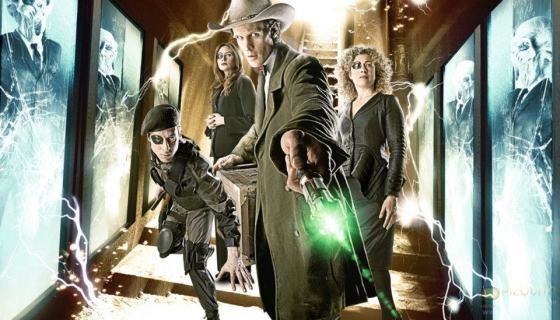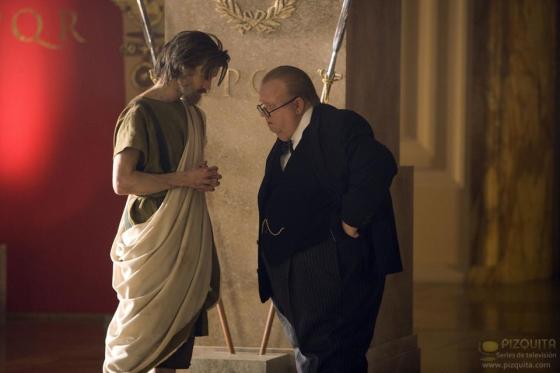
"The Wedding of River Song"
Series 6
Episode 13
Transmitted 1 October, 2011
"All this flirting... do I have to watch?"
Facing his inevitable death at Lake Silencio, the Doctor attempts to discover the secret of the Silence and why they are determined to kill him. In learning the truth, he finds that his end is unavoidable and appears to willingly accept his destruction. River Song, however, disagrees and saves his life, causing a fissure in time and breaking all of reality. History is happening all at once and in order to set things right, the Doctor must die.
The second half of the sixth series of Doctor Who under BBC Wales has received some damning reviews and for good reason. Self-indulgent and empty, the adventures have hardly been the best of the program's run. The centerpiece of the year has revolved around the resolution to the Doctor's death seen in its first episode. Along the way, hints were dangled before the viewer but mainly it was a game of biding time before the magic trick that Moffat would undoubtedly unveil in the finale. By definition, the resolution had to be a magic trick as there was absolutely no other way that the program could get the Doctor out of this trap and frankly, the program is not interested in clever escapes or in intelligent resolutions at all. It's invested all of its faith in 'magic.' By magic, I am referring to a cheap stunt that stands a situation on its head and makes up into down, left into right, etc and everything is back to normal.

The Wedding of River Song was a run around.
Full of outlandish visuals and turnabouts of character (sort of), it was a Möbius strip of storytelling that began and ended at the same point. Moffat no doubt thinks this kind of thing is clever, but it's just a narrative trick that serves no real purpose if the meat of the story is absent. The Doctor and Emperor Churchill have a nice series of expositions in an absurd reality where 'history happens all at once' yet talk shows are still all the rage and no one seems all that bothered. Additionally, 'history happens all at once' apparently implies that all of the past is placed in the most vapid representation of present day life ever, obsessed with current trends and fashions. Will this moment in time really be remembered with a hash tag or an ironic photoshopped kitten image?
The Doctor, dressed as an ancient Roman soothsayer, explains that time has become broken and that it is all because of 'a woman.' Of course, River Song is the unofficial star of the show, why not? The Doctor attempts to tell Churchill about his clever detective work in finding out just why the Silence want to kill him, a journey that demands he visit some bizarre places. Once again, as in last year's finale, Moffat has mistaken Doctor Who for some other program and provides seedy bars full of weird aliens, live chess tournaments with space vikings and other concepts that have no place in Doctor Who and seem like they are from some MMORPG or something. Maybe Moffat's script was mixed up with a pitch to some game developer or something. I will say that the bit where the Doctor ripped out a Dalek's datacore was neat... but it really didn't mean anything.
The path leads to a man who is apparently dead but has actually been replaced by a robot replica timeship driven by the Teselecta... you remember the footnote addition to 'Let's Kill Hitler'? No? Don't worry, the program replays that moment for you. The Teselecta confirm that the Doctor has to die, etc. The Doctor then finds the head of the goofy blue alien guy from last year's finale and more empty dialog is spouted re-establishing what we already know. It's painful.
As the backstory is slowly unveiled, it is revealed that the Doctor and Winston have been fighting the Silence and forgetting them over and over. Before the two are overcome by the monsters they are saved by a crack team of paramilitaries led by Amy Pond. Of course. Why wouldn't Amy be the leader of a paramilitary force? It makes as much sense as last week's revelation that she was a model.

Amy takes the Doctor back to her HQ, an office on a train filled with scrawled drawings of her time with the Doctor and a Papier-mâché TARDIS (cute). Why she would keep these drawings stuck to the wall where her staff could see them I have no idea. I know that if my boss covered his office with drawings taped to the wall of himself dressed as a pirate, vampires and silly robots I'd look for another job immediately. But she's cute as a button and can pull this off.
Area 52, as the pyramid states on the side, is full of Silence preserved in water. Amy reveals, hastily, that the eyepatches that she and her staff wear are mini-drives that maintain the memory of the silence.
This could be the only pertinent piece of information that Moffat gives in the entire story.
Madam Kovarian is captured and being held by River Song who for some reason is revealed in a fashion that implies it is a surprise she has returned. Now I know what it was like in 1973 to continually see the 'reveal' that the Master was back. OF COURSE RIVER SONG IS BEHIND IT ALL!! In any case, more exposition and padding takes place and the Doctor attempts to unwrite history by touching River but it doesn't take for some reason (why? no idea). The Silence break free and Kovarian reveals that they were never prisoners, they allowed themselves to be brought to Area 52 to kill the Doctor because they knew he would come. Of course. Additionally, the eye patches that have become so handy are actually death traps as well. Of course. This is nothing new. Doctor Who has been pulling this trick since it returned in 2005.
This is the same crap kids in my neighborhood tried when we played in my backyard. I'd shoot them and they'd claim to be wearing an invisible bullet-proof vest. Then I'd snicker-snag on them. If I could do the same to this episode, I would.
Everyone retreats to the roof of the pyramid and Amy kills Kovarian. On the roof, River reveals that she has sent a beacon up asking for help to save the Doctor. Outraged, the Doctor says that she has embarrassed him (never a truer word was spoken) and reluctantly agrees to marry her and reveal the 'biggest secret ever' to her. It has been established in her first appearance that River was the Doctor's wife and that she knew the Doctor's real name, so this was Moffat scratching another item from his list... or was it?
Oh-ho-ho! The big big big revelation is that the Doctor is alive after all even though we have seen him get disintegrated several times in this one episode. His master-stroke was to replace himself with a robot full of tiny people off-screen and let it appear that he was dead. Additionally, River reveals that she doesn't know the Doctor's name after all, he lied and so did she! Oh-ho!
Urgh....
Despite this episode being the crystallization of everything wrong with the new Doctor Who (poor writing, over the top silly special effects, an over-reliance on love conquering all), the coda involving the blue head guy being brought back to his cell (why??) is the icing on the cake. Of course the Doctor is the shrouded figure who happily drops his cloak. Interestingly, he reveals that he must 'drop back into the shadows,' suggesting a possible change in tone next year that I am curious about. However, the 'question that must never be asked' is revealed as 'Doctor Who?'
Really?
No... really? That's what is so important that an alien race would unite to hunt the Doctor through time and space, create a Timelord assassin to infiltrate his TARDIS and risk all of reality? Doctor Who? Didn't Moffat watch Silver Nemesis back in 1988? I mean, fair does if he didn't, it's awful. In that story, the Doctor's identity is offered up as some powerful information that could rock all of creation to dust. It was immediately disregarded, however. No one cares. Really. No one.

I have had a love/hate relationship with the BBC Wales Doctor Who and watched its quality wane to disastrous lows in the fourth series and specials. The fifth year got me re-invested with some clever scripts and a well-suited leading man. This series, however, was mostly awful and when it all dances on a finale as terrible as this was, it loses more of its appeal. Smith still shines as the Doctor and manages to make the program watchable, but only just. Upon closer examination, this season was a collection of self-indulgent trite stories about nothing at all aside from moving characters across the screen.
The drama of saving the baby disappeared when it was revealed that the baby was growing with Amy and Rory all along as their best friend. The drama of River Song became less interesting as it was made plain she was a walking plot contrivance, able to stop bullets, rewrite history or do any other impossible thing that the story needed of her. The Doctor's death never happened at all, really, and so therefore all of the hand-wringing over his demise was for nothing. The secret of the silence was so thin that it involved putting a question mark next to the title of the program. Any problem at all became pointless as the phrase 'the Doctor lies' became an unofficial mantra of the series. It under-writes any drama and offers the writer an escape hatch when the script contradicts itself or writes itself into a corner.
I can't say that I was shocked by my disappointment with the finale. The new Doctor Who has traditionally shown itself as a program with no interest in storytelling or adventure. It is more interested in quirky weird visuals that challenge your HD TV, undying romance, and explosions. In that sense, it delivered fine. In the sense of the most imaginative and far-reach science fiction TV series ever developed, it fell so flat it's two dimensional.
I have been reading up on the origins of Doctor Who back in 1962 and was stunned to see the numerous proposals that Sydney Newman passed on as they were too contrived or pat. He was determined to craft a program that would challenge the viewer as well as entertain with an intelligent adventure. He also insisted that only one 'out there' concept be allowed in a script as having too many crammed in reduces the credibility of the product and turns it into a cartoon. I'm not saying Newman said anything new or that he was entirely correct with all of his views, but his vision of Doctor Who could not be further from what is on the screen today.
No comments:
Post a Comment